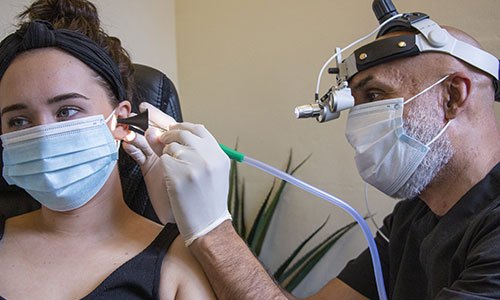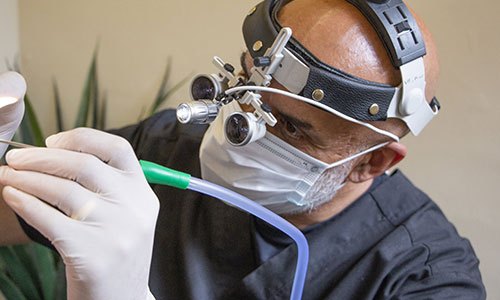Microsuction ear wax removal is the most commonly used technique to remove a build-up of wax from the ear. A build-up of ear wax can affect people of any age, at any time. Ear wax usually passes from the body naturally, but sometimes it needs a little more encouragement.
Microsuction is a painless and quick procedure which safely removes ear wax. We have compiled a list of frequently asked questions to help you to understand more about the microsuction process but if you have any questions feel free to get in touch.
About Ear Wax

Cerumen (or ear wax) – is actually required to help prevent dust and dirt from entering our ears. It’s a natural substance which protects the delicate lining of the ear canal and provides a line of defence against bacteria, fungal infections and water.
Sometimes our ears produce too much wax which can cause discomfort and sometimes pain. By having wax carefully and correctly removed by a professional, you can ensure your ear canal is protected and improve your hearing once again.

Excessive earwax can have some further reaching effects. It can affect your hearing, as well as cause pain in the ear, itchiness, and sometimes, dizziness. If left untreated an individual may experience hearing loss.
Impacted ear wax may improve on its own, but treatment but hearing usually returns completely after impacted earwax is removed. Trying to remove impacted cerumen at home with a cotton swab or by ear candling is not recommended, as this may push the cerumen even further into the ear canal causing even more blockage.
Ready To Book An Appointment?
BOOK AN APPOINTMENTWhat is microsuction?
Ear microsuction entails the use of a gentle vacuum machine to leave the ear free of wax. A microscope allows us to see clearly into the ear to carry out the procedure. The end results for the patient are better hearing and cleaner ears.
How is microsuction performed?
A suction device is used to remove the earwax under a microscope. A small, thin wand is placed inside the ear canal to carefully suction the wax away.
Does microsuction hurt?
Microsuction should not cause any pain or discomfort. However, due to the sensitive nature of the ear canal, extra care is taken to avoid touching the surface so as to prevent discomfort. No anaesthetic or analgesia is generally used to perform the procedure. The suction can sound relatively noisy. If you have an ear infection or inflammation in the ear canal, the procedure may be slightly uncomfortable.
How long does the procedure take?
This is a very quick procedure and usually only takes around 15 to 30 minutes to complete.
Do I need to prepare for the microsuction procedure?
No preparation is required for micro-suction to be performed. However, it is recommended to use olive oil based ear drops for a couple of days before the procedure to soften the wax. If you have an ear infection (external or internal) it is recommended to have this treated by a GP before micro-suction as these conditions can make the procedure uncomfortable. Alternatively, the ear canal can be suctioned to help clear up the infection.
Who can perform the microsuction procedure?
A General Practitioner (GP) is unlikely to perform micro-suction and will most often refer you to a Pharmacist, ENT or Audiologist, all of whom are qualified to perform the procedure. You can make an appointment directly with us and we should be able to accommodate you within a day or two. Or simply walk in to our clinic and we should be able to carry out the procedure right away.
What does ear microsuction cost?
The cost for the procedure is £40 for one ear and £60 for both ears.
How do I know if I need microsuction?
An otoscopic examination is performed before microsuction, which provides video of the inner ear and will detect a wax build-up. If no wax is found, the procedure will not be performed. However, if wax is present, the procedure will go ahead.
Is ear wax microsuction safe?
The procedure is considered to be entirely safe although, as per any medical procedure, there are some risks associated with micro-suction. Some dizziness may occur for a short time after micro-suction. Tinnitus may result from the procedure but should dissipate naturally. Damage to the ear canal is very rare.
Can I have microsuction if I have had ear surgery?
If the ear has healed entirely post surgery, micro-suction is entirely safe for patients who have had ear surgery in the past.
How often can I have microsuction?
Wax is constantly created by the ears and can build-up in the ear canal again. Micro-suction can be performed as often as necessary to remove excess ear wax.
What is the difference between traditional ear irrigation and microsuction?
Experts have a clear view on Microsuction. Based on studies, it is the safest method of ear wax removal, resulting in the lowest risk of complications.
No procedure is 100% risk free, but Microsuction offers clear advantages over ear irrigation:
- For tympanic membrane (eardrum) perforation, microsuction is recommended
- if the ear has an infection of the external or middle ear, microsuction is the only technique safe to perform wax or debris removal;
- microsuction is a more comfortable process, completed in only a few minutes;
- no liquids used during the process;
- no ear drops or pre-treatment required
- pain free
The ear wax microsuction procedure
Welling
Kent
DA16 2PL